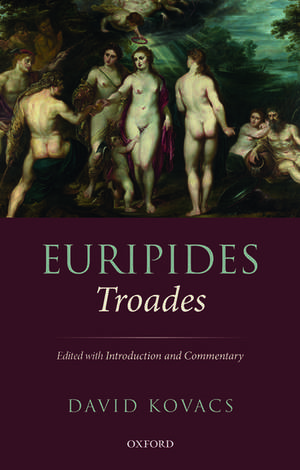Euripides: Troades: Edited with Introduction and Commentary
Autor David Kovacsen Limba Engleză Hardback – 4 dec 2018
Preț: 760.45 lei
Preț vechi: 1085.42 lei
-30% Nou
Puncte Express: 1141
Preț estimativ în valută:
145.51€ • 151.94$ • 120.16£
145.51€ • 151.94$ • 120.16£
Carte tipărită la comandă
Livrare economică 04-10 aprilie
Preluare comenzi: 021 569.72.76
Specificații
ISBN-13: 9780199296156
ISBN-10: 0199296154
Pagini: 386
Dimensiuni: 148 x 221 x 27 mm
Greutate: 0.59 kg
Editura: OUP OXFORD
Colecția OUP Oxford
Locul publicării:Oxford, United Kingdom
ISBN-10: 0199296154
Pagini: 386
Dimensiuni: 148 x 221 x 27 mm
Greutate: 0.59 kg
Editura: OUP OXFORD
Colecția OUP Oxford
Locul publicării:Oxford, United Kingdom
Recenzii
In its detailed approach to text and theme, Kovacs' commentary is a useful resource for any scholar working onTroades.
[A] welcome scholarly achievement. . . . The section on the place of Troades within a trilogy . . . is extremely useful for anyone working on Greek tragic drama. Kovacs, deploying the skills and judgment that have made him such a fine textual editor, carefully marshals the arguments for a connected trilogy, laying out in persuasive detail the evidence for the two lost plays and their thematic integrity with Troades. This approach makes his own focus on the major themes of Troades all the more compelling.
Since I have held substantially the same opinion for almost four decades, I am not inclined to raise an objection. On the connections between the three tragedies in the production of which Troades was a part, I have for a long time wavered between scepticism and agnosticism: Kovacs has overcome my doubts.
The Commentary matches the thoroughness of the Introduction and the examination of textual problems; it is followed by three Appendices, a Bibliography of sensible length, and Indices. This is an edition of exceptional quality, almost certain ... to be the subject of, for example, graduate seminars. I cannot recommend it too highly.
[A] welcome scholarly achievement. . . . The section on the place of Troades within a trilogy . . . is extremely useful for anyone working on Greek tragic drama. Kovacs, deploying the skills and judgment that have made him such a fine textual editor, carefully marshals the arguments for a connected trilogy, laying out in persuasive detail the evidence for the two lost plays and their thematic integrity with Troades. This approach makes his own focus on the major themes of Troades all the more compelling.
Since I have held substantially the same opinion for almost four decades, I am not inclined to raise an objection. On the connections between the three tragedies in the production of which Troades was a part, I have for a long time wavered between scepticism and agnosticism: Kovacs has overcome my doubts.
The Commentary matches the thoroughness of the Introduction and the examination of textual problems; it is followed by three Appendices, a Bibliography of sensible length, and Indices. This is an edition of exceptional quality, almost certain ... to be the subject of, for example, graduate seminars. I cannot recommend it too highly.
Notă biografică
After receiving his doctorate from Harvard University in 1976, David Kovacs joined the classics faculty at the University of Virginia, where he taught Greek and Latin language and literature for forty years. His principal body of work is the six-volume Loeb edition of Euripides' plays and three companion volumes on the text. In matters of interpretation he claims credit, along with a number of other scholars, for a new view of Euripides, which takes its point of departure not from the biographical tradition, parts of which view him as an advanced thinker who is ill-at-ease with the gods, but from the plays themselves: these show Euripides' first-order engagement with such great tragic themes as the fragility of mortal life in the face of the gods.
